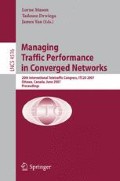Abstract
Paths with loops, even transient ones, pose significant stability problems in networks. As a result, much effort has been devoted over the past thirty years to designing distributed algorithms capable of avoiding loops. We present a new algorithm, Distributed Path Computation with Intermediate Variables (DIV), that guarantees that no loops, transient or steady-state, can ever form. DIV’s novelty is in that it is not restricted to shortest paths, can easily handle arbitrary sequences of changes and updates, and provably outperforms earlier approaches in several key metrics. In addition, when used with distance-vector style path computation algorithms, DIV also prevents counting-to-infinity; hence further improving convergence. The paper introduces DIV and its key properties. Simulation quantifying its performance gains are also presented.
Research supported in part by a gift to the University of Pennsylvania by the Siemens AG Corporate Technology, Information and Communications, Munich, Germany.
Access this chapter
Tax calculation will be finalised at checkout
Purchases are for personal use only
Preview
Unable to display preview. Download preview PDF.
References
Francois, P., Filsfils, C., Evans, J., Bonaventure, O.: Achieving sub-second IGP convergence in large IP networks. ACM SIGCOMM Computer Communication Review (July 2005)
Moy, J.: OSPF version 2. Internet Engineering Task Force, RFC 2328 (April 1998). Available: http://www.rfc-editor.org/rfc/rfc2328.txt
Francois, P., Bonaventure, O., Shand, M., Bryant, S., Previdi, S.: Loop-free Convergence using oFIB. INTERNET-DRAFT draft-ietf-rtgwg-ordered-fib-00 (Dec. 2006)
Malkin, G.: RIP version 2. Internet Engineering Task Force, RFC (November 1998). Available (2453), http://www.rfc-editor.org/rfc/rfc2453.txt
Albrightson, R., Garcia-Luna-Aceves, J.J., Boyle, J.: EIGRP–A fast routing protocol based on distance vectors. In: Proceedings of Network/Interop, Las Vegas, NV (May 1994)
Bertsekas, D., Gallager, R.: Data Networks, 2nd edn. Prentice-Hall, Englewood Cliffs (1991)
Merlin, P.M., Segall, A.: A failsafe distributed routing protocol. IEEE Transactions on Communications COM-27(9), 1280–1288 (1979)
Jaffe, J.M., Moss, F.M.: A responsive routing algorithm for computer networks. IEEE Transactions on Communications COM-30(7), 1762–1768 (1982)
Garcia-Lunes-Aceves, J.J.: Loop-free routing using diffusing computations. IEEE/ACM Transactions on Networking 1(1), 130–141 (1993)
Vutukury, S., Garcia-Luna-Aceves, J.J.: A simple approximation to minimum-delay routing. In: Proceedings of ACM SIGCOMM, Cambridge, MA (September 1999)
Vutukury, S., Garcia-Luna-Aceves, J.J.: MDVA: A distance-vector multipath routing protocol. In: Proceedings of IEEE INFOCOM, Anchorage, AK (April 2001)
Elmeleegy, K., Cox, A.L., Ng, T.S.E.: On count-to-infinity induced forwarding loops in Ethernet networks. In: Proceedings of IEEE INFOCOM, Barcelona, Spain (April 2006)
Gafni, E., Bertsekas, D.: Distributed algorithms for generating loop-free routes in networks with frequently changing topology. IEEE/ACM Transactions on Communications (January 1981)
Park, V.D., Corson, M.S.: A highly adaptive distributed routing algorithm for mobile wireless networks. In: Proceedings of IEEE INFOCOM (1997) [Online]. Available: http://citeseer.ifi.unizh.ch/park97highly.html
Gallager, R.G.: A minimum delay routing algorithm using distributed computation. IEEE Transactions on Communications (January 1977)
Dijkstra, E.W., Scholten, C.S.: Termination detection for diffusing computations. Information Processing Letters 11(1), 1–4 (1980)
Ray, S., Guérin, R., Rute, S.: Distributed path computation without transient loops: An intermediate variables approach. University of Pennsylvania, Tech. Rep. (2006) [Online]. Available http://www.seas.upenn.edu/~saikat/loopfree.pdf
Baillieul, J., Suri, A.: Information patterns and hedging Brockett’s theorem in controlling vehicle formations. In: Conference on Decision and Control, Maui, Hawaii (December 2003)
Author information
Authors and Affiliations
Editor information
Rights and permissions
Copyright information
© 2007 Springer-Verlag Berlin Heidelberg
About this paper
Cite this paper
Ray, S., Guérin, R., Sofia, R. (2007). Distributed Path Computation Without Transient Loops: An Intermediate Variables Approach. In: Mason, L., Drwiega, T., Yan, J. (eds) Managing Traffic Performance in Converged Networks. ITC 2007. Lecture Notes in Computer Science, vol 4516. Springer, Berlin, Heidelberg. https://doi.org/10.1007/978-3-540-72990-7_13
Download citation
DOI: https://doi.org/10.1007/978-3-540-72990-7_13
Publisher Name: Springer, Berlin, Heidelberg
Print ISBN: 978-3-540-72989-1
Online ISBN: 978-3-540-72990-7
eBook Packages: Computer ScienceComputer Science (R0)

